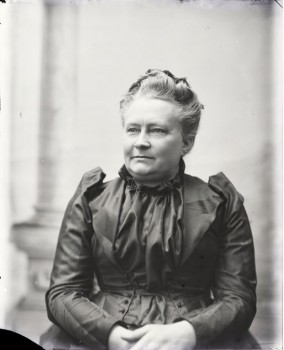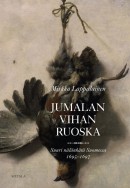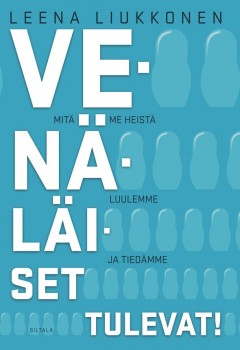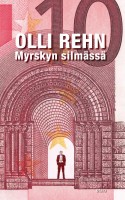Search results for "2010/02/2011/04/2009/10/writing-and-power"
The Schoolmaster’s bicycle trip
30 June 2005 | Archives online, Fiction, Prose
A short story from the collection Heta Rahko korkeassa iässä (‘Heta Rahko at a great age’, Otava, 1947). Introduction by Vesa Karonen
He was an old teacher, retired, mostly known as ‘the Schoolmaster’ in this small town. It was common knowledge that he’d always been a keen gymnast and sportsman, and after retirement he began pursuing his favourite pastimes in earnest. Evidently he revelled in moving about, like a baby on the crawl, or a feisty youth. He was a man with no personal ties, with no one to patronise or distract him.
‘You grow no wiser, even with age,’ the small-town folk kept sighing. In response to one of these groans, Porki the factory owner said what they thought was almost blasphemy:
‘When did old age ever produce any wisdom? It’s always demolished any little there was….’
And meanwhile, covertly envious, he watched the youthful-looking Schoolmaster striding along his path, lean, sinewy, stern-faced, his tuft of beard only reluctantly thinning and greying. Well, there was a person who’d realised life was motion – and believed it! But Porki and the other bigwigs in the town grew bloated and obese, huffed and puffed, and yawned. More…
When sleeping dogs wake
31 December 1994 | Archives online, Fiction, Prose
Extracts rom the novel Tuomari Müller, hieno mies (‘Judge Müller, a fine man’, WSOY, 1994). Introduction by Soila Lehtonen
In due course the door to the flat was opened, and a stoutish, quiet-looking woman admitted the three men, showed them where to hang their coats, indicated an open door straight ahead of them, and herself disappeared through another door.
After briefly elbowing each other in front of the mirror, the visitors took a deep breath and entered the room. The gardener was the last to go in. The home help, or whatever she was, brought in a pot of coffee and placed it on a tray, on which cups had already been set out, within reach of her mistress. The widow herself remained seated. They shook hands with her in tum. The mayor was greeted with a smile, but the bank manager and the gardener were not expected, and their presence came as a shock. She pulled herself together and invited the gentlemen to seat themselves, side by side, facing her across the table. They heard the front door slam shut: presumably the home help had gone out. More…
Saikansalo the racing cyclist
30 June 2005 | Archives online, Fiction, Prose
A short story from the collection Heta Rahko korkeassa iässä (‘Heta Rahko at a great age’, Otava, 1947). Introduction by Vesa Karonen
Saikansalo was a racing cyclist and the country’s best, unquestionably. His Achilles tendons were superlative.
So when he found no rival in his own country. the athletics bigwigs put their heads together and hinted at the idea of sending him abroad to win a further reputation somewhere in the south – France, Italy or the like. They warned him that he’d have to be in good trim because of the enervating heat in the southern climes.
‘Heat!’ Saikansalo said. ‘There’s an old saying “Heat never broke anyone’s bones”….’
‘But it melts you like lard,’ his chum kept claiming. ‘The sun climbs really high there – scorches right down on your topknot, and boils your brains….’ More…
Updated, alive
8 May 2014 | Non-fiction, Reviews

Minna at 50. The Finnish flag is flown on her birthday: 19 March has been named the Day of Equality. Canth also flies on the tail of one of the aircrafts of the Nordic airline Norwegian: the fleet carries portraits of ‘heroes’ and ‘heroines’ of four Nordic countries (the other Finn is the 19th-century poet J.L. Runeberg). Original photo: Viktor Barsokevich / Kuopio Museum of Cultural History
Herkkä, hellä, hehkuvainen – Minna Canth
[Sensitive, gentle, radiant – Minna Canth]
Helsinki: Otava, 2014. 429 pp., ill.
ISBN 978-951-1-23656-6
€40.20, hardback
There are two sure methods of preserving the freshness of the works of a classical author in a reading culture that is increasingly losing its vigour.
The first is to give a high profile to new interpretations of them, either in the form of scholarly lectures or of artistic re-workings, such as dramatisations, librettos or film scripts. Another unbeatable way to keep them alive as a subject of discussion is an updated biography, through which the author is seen with new eyes.
Minna Canth (1844–1897) is now celebrating her 170th anniversary, and she is fortunate in both respects. Having begun her literary career in the late nineteenth century, she still continues to be Finland’s most significant female writer.
Her influence on the role of women in society and, in particular, her promotion of girls’ education, is the cornerstone of Finland’s social equality. In the twenty-first century Canth’s plays are still receiving new interpretations, and they have also been made into operas and musicals. (Read her short story, ‘The nursemaid’, here.) More…
Lest your shadow fade
31 March 1987 | Archives online, Fiction, Prose
An extract from the novel Jottei varjos haalistu (‘Lest your shadow fade’, 1987). Interview by Erkka Lehtola
‘… learn, then, to like yourself.
Dancing beside your shadow, laugh and play.
Dance always in the sunlight, lest your shadow fade.’J. Fr. Erlander, 1876 (Erika Kuovinoja’s grandfather)
‘Tis in life’s hardness that its splendour lies.’
J. Fr. E., 1890
Three days before the date fixed for the funeral, the minister directed his steps towards the home of the deceased, trying, as he walked, to compose his thoughts, which were full of righteous Lutheran anger. There were many good reasons for this. On the other hand, nothing that had happened in the past ought to make any difference, now that he was on his way to visit a house of mourning. A visit that called for the exercise of understanding, and even, if possible, kindness. It was a lot for anyone to expect, even of a clergyman. It was not by his own desire that he was paying this call: it was a matter of duty. And this time he was the protagonist. Petulantly, his shoes crunched the gravel. More…
Season’s greetings
31 December 2002 | Archives online, Fiction, Prose
An extract from the novel Kolmastoista tuoli (‘The thirteenth chair’, Atena, 2002)
The start of the Christmas season was difficult for everybody, but it was one big upset for Ron and Dan, the twins. At Christmas, apparently, their whole world, all their schoolmates and backyard-mates, the whole gang of them, were avoiding the twins. No one seemed to be even talking to the twins, who said everyone was just concentrating on ‘being nice’.
‘Nice!’
The pain on the boys’ faces looked the real thing. They were without chums, and the reason was even more annoying.
‘They have to be nice, for they’re expecting presents from Father Christmas.’
Christmas was coming and was having a weird effect on the youngest. For the twins, effort and a reward for a good try were completely foreign concepts. At this point, their lives were sheer adventure. They were lavished with overflowing care and love – and not one Christmas present. More…
The love of the Berber lion
30 December 2008 | Fiction, Prose
A short story from the novel Berberileijonan rakkaus ja muita tarinoita (‘The love of the Berber lion and other stories’, WSOY, 2008). Introduction by Janna Kantola
The lion’s name was Muthul. He was an old Berber lion from the Atlas Mountains. He had a black mane, a black tail with a bushy tip and the scars of many battles on his hide.
He had grown up as a lion cub in the royal palace at Carthage at the time when the Romans, led by Scipio the younger, destroyed the city with fire and sword. The palace was set ablaze, a bloody battle ensued in the gardens, Romans impaled on arrows lay strewn in the rose bushes, Carthaginian blood dyed the water in the fountains. Someone had let all the palace animals, wild and tame alike, out of their cages; they were running around wildly, killing each other in the grip of panic, then disappeared inexplicably. More…
Mirkka Lappalainen: Jumalan vihan ruoska. Suuri nälänhätä Suomessa 1695–1697 [The lash of God’s wrath. The Great Famine in Finland 1695–1697]
7 September 2012 | Mini reviews, Reviews
 Jumalan vihan ruoska. Suuri nälänhätä Suomessa 1695–1697
Jumalan vihan ruoska. Suuri nälänhätä Suomessa 1695–1697
[The lash of God’s wrath. The Great Famine in Finland 1695–1697]
Helsinki: Siltala, 2012. 262 p., ill.
ISBN 978-952-234-140-2
€25.50, hardback
There were two major famines in Finnish history: the Great Famine of 1695–97 and the hunger years of 1867–68. Basing her work on the latest research, historian Mirkka Lappalainen has written a general study of the earliest and most deadly years of crop failure. The famine struck Europe just as it was experiencing the main phase of the so-called Little Ice Age. Finland was one of the worst affected countries, as it had only just begun to derive a living from agriculture, and nearly a third of its population died. Finland was governed by the autocratic, centralised great power Sweden; frosts and rains destroyed hundreds throughout the kingdom, but the magnitude of the disaster in Finland was increased by the bureaucratic inertia of the centre in distributing aid, as well as the emergency food (moss, for example) which caused intestinal disorders, and the spreading of disease by beggars. The aid was also distributed unequally within the regions of Finland. In her book Lappalainen describes the fates of kings, gentry and rural poor as reflected in sources that include letters and official court records.
Translated by David McDuff
Air, blue and gold
16 January 2014 | Fiction, poetry
Poems. Introduction by Tuula Hökkä
The arch bridge
From Ylitse vuoren lasisen (‘Over the glass mountain’, 1949)
And God said: to others I’ll give other tasks, but the task I’ll give to you
is to make a curving bridge, my child, with an arch that’s round and true.
For everywhere around the earth human beings are laden with gloom,
and they’ll come to cross an arching bridge in their anguish and their doom.
Make a bridge that spans the precipice, a bridge over the abyss,
one that shines to my glory with radiance, sparkling like this.
I said: They will come with heavy boots, and heels caked with clay –
how can my bridge withstand their weight, yet also shine this way,
not tarnish or break apart as their crowding presence nears?
And God said: well, it can only be done by means of blood and tears.
Your heart is stronger than mountain rock, the ore that’s buried there –
Put a piece of it into the bridge support, and you’ll get the bridge to bear.
Add a piece of the hearts of those you love, and I know they won’t condemn,
but will surely grant you forgiveness if you make a bridge for them.
Make a bridge to the glory of God, my child, make a bridge with arching light
that will span the depths and shine for ever, with radiance sparkling bright.
Don’t lock the sorrow out of your heart as the bridge you make appears.
Nothing gleams more beautifully than the brilliance of pure tears. More…
In the north
30 September 1988 | Archives online, Fiction, Prose
A short story from Luvaton elämä (‘Forbidden life’, 1987). Introduction by Tero Liukkonen
I
I went up north in a sleeping car. It was a relief to see that even in Tampere there was a sign on the car saying ‘Kemijärvi’. That meant I could sleep the whole way. I had the lower berth; a couple more like me were sleeping in the same compartment – just ordinary women. I was nevertheless silent and reserved, so that neither of them would want to make me into a travelling companion. And they did leave me in peace.
I read for a bit, till I began to feel more at home, and settled down to sleep with my woollen socks on. I deliberately went almost to sleep while not wanting to drop off completely; and I gradually reached a point where I didn’t know which direction the train was going in. That was liberating. It was all the same which direction we were going in. The motion of the train got through to my nerves and started releasing things. More…
What does the neighbour think?
26 April 2013 | Essays, Non-fiction
 For more than 20 years journalist Leena Liukkonen has been thoroughly involved with Russian culture, commerce, language and psyche. The subtitle of her new book of essays Venäläiset tulevat! (‘The Russians are coming!’) is ‘What we think and know about them’, and refers to the fact that the Finns do not really know their eastern neighbours very well. Liukkonen writes with insight about the differences in history, mentality and world view
For more than 20 years journalist Leena Liukkonen has been thoroughly involved with Russian culture, commerce, language and psyche. The subtitle of her new book of essays Venäläiset tulevat! (‘The Russians are coming!’) is ‘What we think and know about them’, and refers to the fact that the Finns do not really know their eastern neighbours very well. Liukkonen writes with insight about the differences in history, mentality and world view
Extracts (under original subtitles) from Venäläiset tulevat! Mitä me heistä luulemme ja tiedämme (Siltala, 2013)
WAR, REMEMBERING AND FORGETTING
In café conversations with other visitors to Russia, we often react with exasperation to the fact that discussions in Finland only ever start with the Winter War. Sometimes we wonder why the threshold between us and our neighbour to the east is still so high. My own living contact with the past, however, makes it clear to me that everything the elderly carry round with them could not have been simply shaken off with the passage of time. Nor can the next generation just break away from it. My own experience also reminds me how distant our eastern neighbour was during peacetime. After all, a very few have made the long journey to the country next door. To many people, the old story was the only story there was about Russia. More…
Olli Rehn: Myrskyn silmässä [In the eye of the storm]
23 November 2012 | Mini reviews, Reviews
 Myrskyn silmässä
Myrskyn silmässä
[In the eye of the storm]
Helsinki: Otava, 2012. 320 p.
ISBN 978-951-1-26250-3
€ 30.50, hardback
Finland’s Olli Rehn currently serves as European Commissioner for Economic and Monetary Affairs and vice-president of the European Commission. He had previously occupied the post of Commissioner for European Union Enlargement. During the long economic crisis that began in Greece is increasingly affecting the whole of Europe, he has been ‘in the eye of the storm’, looking for ways to overcome the difficulties of member states. In this recent ‘interim report’ aimed at the general public, Rehn describes his personal experiences against the background of the crisis during its troubled and at times extremely hectic moments, and also presents recipes for overcoming it, taking into account both the Finnish point of view as well as broader global connections. He sees the success of the EU as being dependent on the creation of a banking union, the strengthening of European economic and monetary co-operation and the reinforcement of the green economy. The book opens up a fascinating perspective on the core of the wielding of power within the EU. Rehn writes fluently – but as an official, without revealing all that has taken place behind the scenes.
Translated by DavidMcDuff

